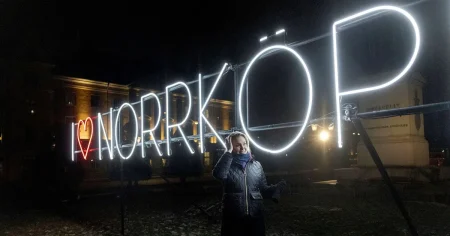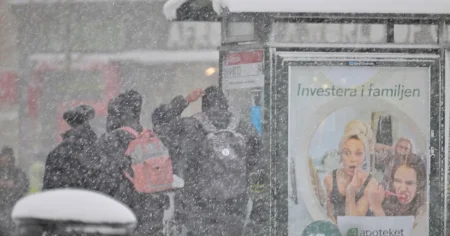A family of twelve children in Gothenburg, Sweden, became the subject of a legal case involving their parents, accused of gross violation of parental responsibility. The case centers around ten of the children, as the youngest was deemed too young to be involved and the eldest too old. The prosecution contended that the parents deliberately obstructed social services’ attempts to take the children into care, despite multiple court orders issued under the LVU (Care of Young Persons Act). The legal framework clearly defines the parents’ culpability, however, those involved in the case acknowledge a broader societal failure in protecting these children.
Police investigator Charlotte Berg, who interviewed all the children, expressed her dismay at the systemic breakdown. The children’s testimonies reveal a stark deprivation of basic welfare rights. A seven-year-old boy vaguely recalled attending preschool, while his eight-year-old brother recounted a single day of school before the ”story ended.” Their thirteen-year-old brother, despite being able to drive, had only completed three semesters of schooling. Two of their sisters lacked proper registration with the tax authorities, and none of the children had ever received dental care. These accounts paint a grim picture of neglect and a missed opportunity for intervention by various societal institutions.
The children remained undetected by authorities until the two eldest sisters, aged 14 and 15, ran away. This triggered a more forceful response from social services, culminating six months later in the discovery of the parents and remaining siblings at a campsite. Investigator Berg attributes the delay in intervention to the family’s frequent relocation and the ensuing loss of information between different social service departments. The sheer scale of this case, involving ten children systematically deprived of their fundamental rights, is unprecedented in Berg’s experience. The family belongs to the Roma minority in Sweden, with roots primarily in Värmland, where several of the children were last registered and briefly enrolled in school.
The children’s school enrollment was not initiated by the family, but rather by the school itself, acting on a rumor of their presence in the municipality. Similarly, their disenrollment at the end of the term resulted not from any communication from the family, but from a lack of contact and attendance. Some of the older children reported receiving ”home schooling” from their father and a woman who lived with the family. Their mother, they stated, was not involved in their education due to her limited academic abilities. This informal, and arguably inadequate, educational arrangement highlights the children’s isolation from the formal education system and the lack of oversight from responsible authorities.
The mother, despite being raised in Sweden and only in her early thirties, is illiterate and admits her failure to ensure her children’s education. While expressing remorse and apologizing for the situation, she denies deliberately obstructing social services’ involvement. She claims ignorance of the meaning of LVU and the implications of the orders against her, attributing this to her illiteracy and inability to understand official documents. Her defense raises questions about the effectiveness of communication and support provided by social services to marginalized families and individuals with limited literacy.
The father admits to two instances of retrieving two of his children from foster care, persuading them to run away. He has also pleaded guilty to several fraud charges related to fake Facebook advertisements, which were dealt with in the same trial. The prosecutor is seeking a three-and-a-half-year prison sentence for the father and a three-year sentence for the mother. The prosecution argues that the crimes against the children were motivated by honor, a claim both parents deny. The inclusion of the honor motive potentially carries a heavier sentence, highlighting the cultural sensitivities involved in the case. The verdict is awaited, with the father remaining in custody. The outcome of this trial will hopefully serve as a catalyst for improved child protection measures and increased support for marginalized communities.














